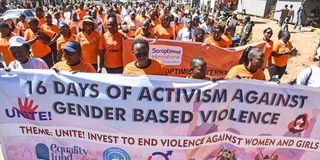Marital rape: Day women refused to suffer in silence

A parade in Eldoret, Uasin Gishu County, marking 16 Days of Activism Against Gender-Based Violence.
What you need to know:
- On several occasions in the past, Ms Achieng’s husband forced himself on her claiming it was his conjugal right.
- Nevertheless, she chose to stay; her children needed a present father while the last born was also only days old.
- Eventually, she walked out of the marriage.
- Together with a group of friends, they formed the Slum Women Foundation in Manyatta, Kisumu County.
In 2019, Roselyne Belinda Achieng’ walked out of her marriage after living with her husband for only four years. She was 22 years old.
This is not what the now 26-year-old envisioned when she met her husband a couple of years ago in church. The two later got married.
Ms Achieng’ had enrolled at Kenya Institute of Mass Communication for a Broadcast Journalism course in 2014, but dropped out for lack of funds.
All seemed rosy until one evening when she had just come home, having been discharged from hospital after delivering their second child.
A few hours in, her husband demanded that they get intimate, a request she turned down as she was still nursing some wounds and was also tired.
He would hear none of it. “I just felt him on top of me and had his way with me,” says Ms Achieng’.
On several occasions in the past, he had forced himself on her claiming it was his conjugal right.
Ms Achieng’ invited her husband’s brother to discuss the issue, but this did not help.
“On the following day, his brother said it was something they did to wives, and perfectly normal,” says Ms Achieng’ who adds, however, that as far as she was concerned, her husband raped her.
Nevertheless, she chose to stay; her children needed a present father while the last born was also only days old.
The violence did not, however, stop, and though she wished to share her ordeal with friends, she knew not how to start.
Her next option was to seek help from the church, because this was where it had all begun.
The spiritual leaders advises the couple to resolve their issue amicably. What pained Ms Achieng’, however, is that no one spoke about the fact that she had been raped severally by the person she trusted most.
She felt like the church was siding with the husband instead of solving the real issue.
One day, her husband turned violent and she screamed, attracting neighbours to her rescue.
Also Read: Here’s how to identify a violent partner
Events of the day left her husband ashamed while the bond between them grew weaker with each passing day.
Eventually, she walked out of the marriage. Her last-born son was already a year old as she moved in with her parents in Manyatta, Kisumu County, trying to figure out her next move.
“One time, I came across women huddled in a group speaking about rape in their marriages. While I did not join in, I realised I was not alone. There were more silent sufferers in matrimonial homes,” says Ms Achieng’.

Roselyne Belinda Achieng', a survivor of intimate partner violence .
She adds: “That is why I later decided to speak up. There are women across the world who have gone through similar experiences but afraid to speak up.”
She then made it habit to share her story of abuse with other women in the slums hoping she could help them open up and share their struggle.
Together with a group of friends, Ms Achieng’ would counsel the women who approached them. The group gave birth to Slum Women Foundation, a non-government organisation championing women’s rights.
It focused on ending intimate partner violence among married couples by making women understand that intimacy also requires consent, married or not.
The forum created a safe space for women to open up and share their stories in order to heal, and create awareness that rape in marriages does exist.
The organisation founded in 2019, would also donate food, sanitary towels and face-masks to women and children during the Covid-19 pandemic.
Initially, she realised that some women were afraid to speak up, they would instead be given papers to anonymously write their concerns without writing their names. This would be followed by counselling, done in groups.
“Our efforts gave birth to the Kisumu Women Writers Association,” says Ms Achieng’.






